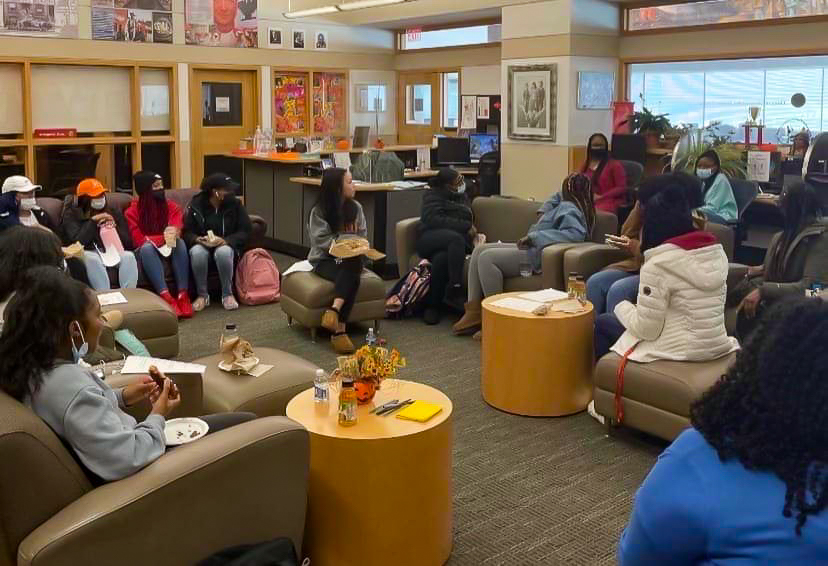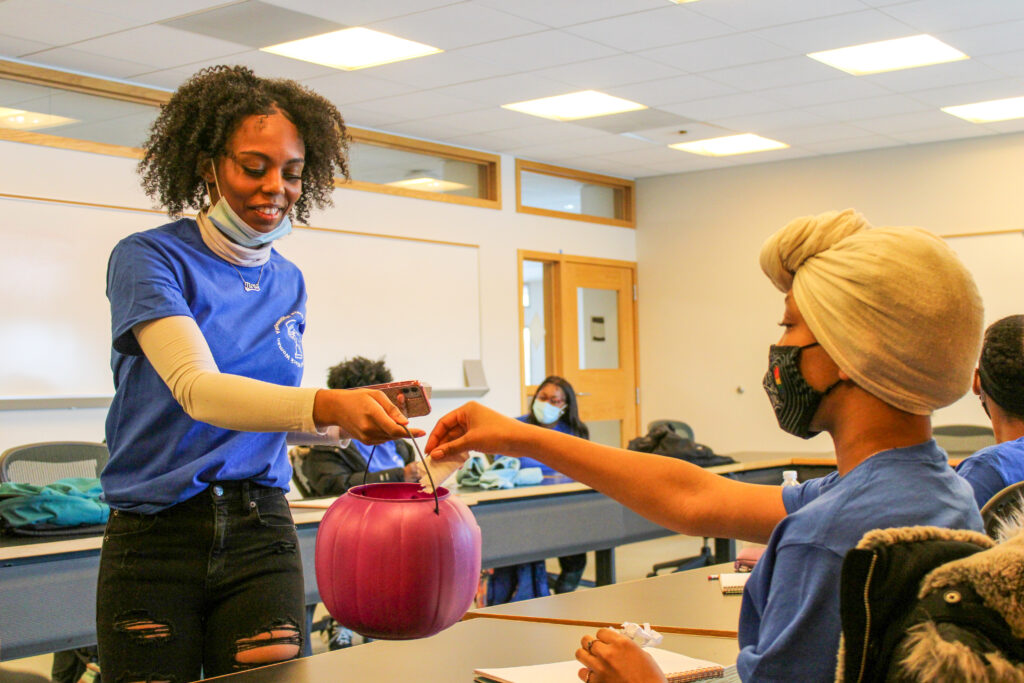
There were girls everywhere, squeezed together on the couches, perched upon the footrests, lounging in the office chairs. When had the Office of Multicultural Student Services ever been this full?
When social work senior Laila Duncan and criminal justice senior Nia Goins officially brought Sistah Circle, an initiative within the OMSS that strives to create a supportive, safe space for women of color, while facilitating communication and development, to Ferris with their kickoff event last November, they brought unprecedented traffic to the OMSS.
Duncan and Goins had their own reasons for bringing this group to Ferris, one they shared was the belief that multicultural women were being underserved.
“In the campus environment, sometimes it was very clear that, while certain demographics would be a focus, multicultural women usually weren’t the focus. And it would be in departments, it would be in RSOs, it would be in classes and stuff like that. We wanted to create a space where we were the focus and not the afterthought,” Goins said.
The success of Sistah Circle’s kickoff meeting can be attributed to the fact that this program brings something that is hardly seen on campus, a place where Black and multicultural women are the focal point.
“We had girls come out just because it was that space. They might not come to all the meetings, but they came out just to show their support for that type of initiative program,” Duncan said.
You Beautiful Black Woman, an RSO comprised of women from different backgrounds for the purpose of uniting its members and cultivating friendship, leadership and scholarship, while enhancing the campus environment, shares a similar purpose.
“We are an organization that likes to collab with other organizations and bring together a community, however, we do like to create a safe space for Black woman. That is our focus,” YBBW Vice President Tiera Gladney said.
The women of YBBW have also noticed that multicultural women don’t receive the same amount of attention on campus compared to their white counterparts.
“You can see [the difference] in the support… It’s hard for our events to actually get that publicity and get out there [because] people don’t even know what we’re doing. It is not because we’re not putting it out there, we just don’t get the same support as other organizations, unless it’s February,” Gladney said.
Take the Torch for example. When you look at all the editions released this school year, the only time Black students have been featured is when they excel at sports. There have been no stories written about any of the other accomplishments or activities of Ferris’ Black students, even though they are active on campus every day.
“[Ferris] promotes white fraternities, sororities or organizations more than they would a Black fraternity, sorority or organization. So, our [information] doesn’t get out much to the Black women, or [Black] people in general, on the campus,” Kylah Robinson, a member of YBBW, said.
Since Black safe spaces, such as YBBW and Sistah Circle, go against the norm and prioritize representing and accommodating marginalized individuals, many white individuals have spoken against these spaces because they make them uncomfortable.
In an article written for The Atlantic, Emily DeRuy writes, “While many see the creation of safe spaces for Black students, LGBT students and other minorities as a positive step toward helping them navigate campus, others see it as resegregation and a step backward.”
What Goins wants white individuals to understand is that the goal of these spaces is not “intentional exclusion.”
“It’s not supposed to offend you. If anything, I would hope that more people want to help to support it because of the fact that it is spotlighting experiences that maybe aren’t spotlighted usually. I would hope that you would use your privilege to help that, [instead of trying] to break that,” Goins said.
Despite these complications, the leaders of Sistah Circle and YBBW continue to host events and provide for multicultural students, and they are rewarded for their efforts every time they see personal improvements in the members of their respective programs.
“They build connections with each other, you know. I see them a lot on campus, and they say hi every time they see me, which they probably wouldn’t have done before, and it’s just really nice,” Duncan said. “I think it’s really opening up because a lot of the new incoming students are really antisocial with being online for so long. So, it’s nice to see them finally coming out of their shell and making connections with other people.”
They have also seen progress within themselves.
“I think [being in YBBW and attending a PWI] has helped me grow, and, honestly, since we’re being real here, I’m a Black woman… I feel like constantly being reminded that you’re Black [when] going through certain situations has helped me… understand what I’m going to face in the real world… You might get accepted in some places, and some places you might not, but that doesn’t mean that I’m going to stop. I’m just gonna keep working hard, and I’m going to go get what I want,” YBBW’s President Ne’Asia Cooper-Harris said.
Because not every student is able to commit the time or money required to become an official member of a student organization, the OMSS is also a safe space that is open to all students, and it has the resources required to meet the individual needs of multicultural and marginalized students.
“Come out to the OMSS in general. It’s kind of been a little bit more difficult since COVID to get more traffic into the office, but the office is a safe space for you too… We have movies playing, we have music playing, come in here and do homework,” Goins said.
Sistah Circle has monthly meetings on Tuesdays at 11 a.m. in FLITE 304. Stop at the OMSS’s front desk to pick up a copy of a detailed schedule with the discussion topics. Soon, YBBW will be welcoming new girls for their spring intake group. There will be an informational on Feb. 22, and more details are to come. To make direct contact, look at YBBW’s page on Bulldog Connect.

